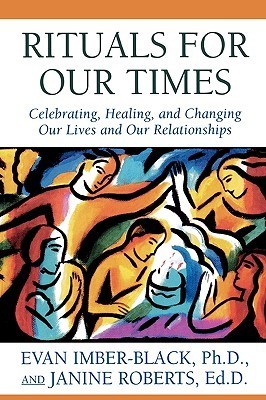RITUALS FOR OURTIMES Celebrating, Healing, and Changing Our Lives and Our Relationships is a 333 page book whose central theme is to analyze the meaning of rituals in our times and how they influence how we perceive reality and act as individuals and group entities.
Imber-Black and Roberts are two therapists that work with individuals, couples and families since 1970. They have shown a big interest in family rituals because by analyzing them they found it to be possible to learn more about human history and current relationships. These authors show us that rituals have been a powerful way to harness the sources of individual and joint creativity, heal personal pain and celebrate life.
It is also important to mention that their participation in the book Rituals in Family Therapy and Family Therapy (1988) was very successful and their first exploration about this topic.
They found that when people were given a framework to examine past and present rituals they often became markers of rich and significant rituals in their current lives.
They also consider that rituals provided a key to unlock confusing and painful family relationships and friendships.
Simply observing a ritual could speak volumes to any of us about our own beliefs and our repeated interactions with those who matter to us.
Imber-Black and Roberts are attempting to show how rituals can simultaneously connect us with our common humanity and with each of our own unique paths in life.
The book shows the richness of diversity illustrated with a variety of ethnic and religious heritages.
Each chapter pays special attention to the problems that arise within nuclear families, extended, single parent, remarried families, as well as single adults and couples.
The authors also pay particular attention to how changing roles are reflected in our rituals, and how to revitalize traditions.
They present rituals as an opportunity to get both a familiar meaning and a mysterious one at the same time, because familiarity provides anchor points to help us make transitions into the unknown such as turning a year older, celebrating an anniversary, or becoming a married person.
Rituals contain the use of symbols that embrace meaning that cannot always be easily expressed in words. Also symbols and symbolic actions are powerful activators of sensory memory.
According to these authors rituals can be classified in four categories:
Daily, traditions, celebrations and, life-circle.
Function for five purposes:
• Relating: Shaping, expressing and maintaining relationships.
• Changing: Lifestyles, values, beliefs.
• Healing: recovering from relationship betrayal, trauma, or loss
• Believing: voicing beliefs and making meaning
• Celebrating: Affirming
Six ritual styles:
Minimized, interrupted, rigid, obligatory, imbalanced, and flexible.
Every family develops its own individual style of ritual with the influence of the experiences in the particular family history.
When I started reading this book at some moment I found it a bit repetitive in terms of the role of rituals and traditions as a connector between past and current generations. I can see the idea of displaying transgenerational models as part of the perspective of this book.
However, the great variety of stories that appear in this book showed that rituals, despite being important with the family structure, can be strong stressors for members of non-traditional families.
When the authors made an invitation to create traditions tailored to their individual family beliefs and needs, I realized the presence of a structural approach in which the ritual can be manipulated as a way of delineating new family hierarchies, thus giving opportunity to changes is gender roles and opening of acceptance to families with new structures such a single parents, or LGBT couples.
Thinking about rituals and the way that could be interpreted and attribute meaning in our existence according to the three compelling epistemological frameworks I see the rituals as:
• Premodernism: Rituals are an ultimate truth in our share existence and this truth is not visual or behaviorally observed in the physical world, it is a deeply felt, intuitive experience. For that reason could be extremely difficult make any change in the system with very rigid rules and a stressful atmosphere in the family.
• Modernism: Rituals can be questioned according to scientific knowledge of academics who could make, measure, and observe changes.
• Postmodernism: Rituals can truly account for the life experience of each individual, because there is not absolute truth and the reality may be continually deconstructed and reconstructed by each individual.
Rituals play a very important part in the human life. However, the construction and interpretation may vary depending on the culture and the context.
However, I agree that the analysis of the rituals of our times is an important exercise to learn about our past, understand our present, and plan a future with greater self-awareness.
This sentence that appears in the book read to me as words with meaning that resonates through time itself:
“The ritual in our lives contribute to our changing sense of ourselves over time, while also connecting us to the generations who came before us.”
It is our rituals that simultaneously connect us with what is universal human experience, while also allowing our unique personhood, family, ethnic group, and culture to emerge.

